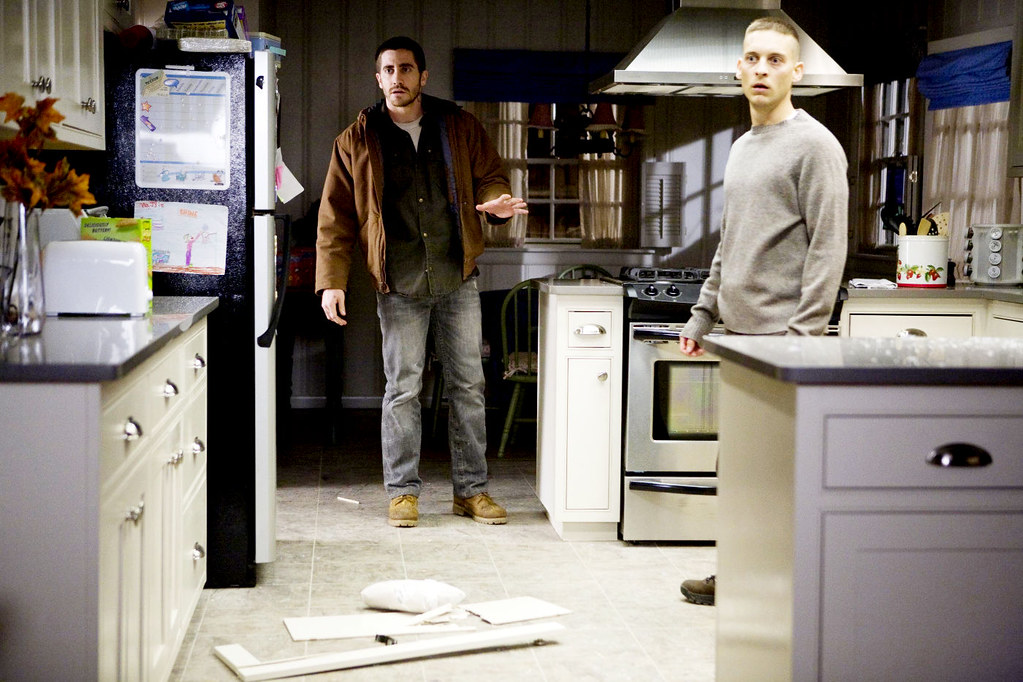Finally – on my third try in ten days – I got to see a film as good as its promotion suggests, and it’s a remake. Brothers is Jim Sheridan’s version of the 2005 Danish film Brøde, which won a variety of awards at film festivals or reserved for European films. From what I gather, Brothers is a very close approximation of the original. In fact, Roger Ebert knocked it down half a star because it seemed too finished compared with the imrpovisatory feel of the original. I can imagine that – Sheridan’s one superhit, My Left Foot, left me underwhelmed, perhaps because I knew a writer far better than Christy Brown & at least equally disabled in the late Larry Eigner. Still, I’m not sure how fair either comparison truly is. Plus I can just imagine Walter Benjamin howling at the idea of retaining an improvisatory feel on a remake. What’s wrong with that picture?
There’s nothing wrong with this one. Ebert’s one-time TV collaborator, Richard Roeper, has been widely quoted calling this the best movie of the year. I haven’t seen enough films yet to make that call, but it’s certainly the best of the three I’ve seen in the December award-seeking film season, and by a long shot.
For one thing, the film has four, maybe five, incredible acting performances, that could justifiably end up as Oscar nominations. Natalie Portman is excellent, Jake Gyllenhaal even better as the ex-con fuck-up trying to help his sister-in-law & put his life together again after his brother, Tobey Maguire in the best role of his career, is lost in Afghanistan after his chopper is shot down. Sam Shepard, normally an actor who makes me wish he’d stick to writing plays, is fabulous as the brothers’ hard-ass unforgiving alcoholic father. And Madison Bailee, who just turned ten in October, gives the best performance by a child actor I can recall seeing since Patty Duke was Helen Keller.
But the center of this film is Maguire. He has to be the most widely miscast actor of his generation, cashing in fat checks for Spiderman & generally unsuited for every role he’s been in since he nearly stole The Ice Storm, one of the best American films ever made, twelve years ago. In Brothers he undergoes a physical transformation on the scale of early DeNiro or more recent Matt Damon, looking almost ghostlike thin. Far more important, he keeps a stillness to himself that starts off as the typical Marine’s buttoned-down attitude but later comes across as nearly volcanic containment of equal amounts of rage & guilt. He’s been forced to look right down into the center of his soul & been horrified by what he’s seen & done. He’s inconsolable, paranoid, with every nerve-ending absolutely raw. It is easily the best film performance I’ve seen this year, or in many years. And I can barely believe I’m typing that about Tobey Maguire.
Maguire gets less screen time than do Gyllenhaal or Portman, the family left behind when the helicopter goes down. Gyllenhaal is trying to get through parole by spending his evenings in bars, while his father does nothing to hide his contempt for him, contrasting him constantly with his high-school quarterback turned Marine captain brother. “He was too small,” Shepard says, “but he could throw,” and “he didn’t quit. That was the biggest difference.” Most of the film is about Portman grieving & Gyllenhaal trying to figure out how to stand up on his own two feet. The key to this comes when Gyllenhaal talks friends of his into redoing the kitchen in Portman’s tiny house. The three members of the crew, led by Ethan Suplee (best known for his own role as the fuck-up brother, Randy, on My Name is Earl), would be the film’s one clunker moment, an instance of Hollywood shtick entering into the space of the drama, were it not for the anger one of them expresses when Madison Bailee drops a bucket of paint on him. Her reaction to his anger – and that of her mother – are important indexes for what’s to come. And, indeed, it comes in the spanking new kitchen when it happens.
If the film does have one moment that I think you can fault it for, it’s the ending. Any number of conclusions are possible, and the one chosen is the road of least resistance – you can almost imagine focus groups recoiling at any of the others, even if they are more real or true. Still, you can feel the filmmaker flinching right at the critical moment. Not having seen Brøde – whose co-author & director Susanne Bier gets a writing credit for Brothers – I can’t tell if both films are identical on this point, but I’ll be surprised if they’re not. This is, counter-intuitively, not nearly the cop-out it might seem. Rather, I think the fear is that having dragged you through hell to get here, one of the louder, more likely conclusions might erase what came before. This way, the film permits it to linger in the imagination. And linger it will.






